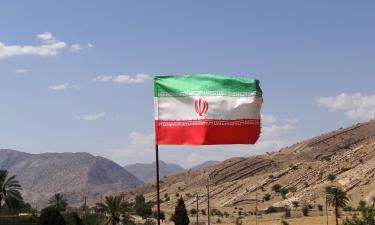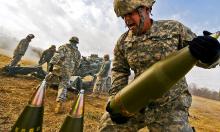The Origins of Russia's Anti-Americanism
 Few Russian politicians support pro-American positions. Anti-Americanism is as natural for Russian conservative observers as love for the native land.
Few Russian politicians support pro-American positions. Anti-Americanism is as natural for Russian conservative observers as love for the native land.
Good writer and not-really-successful revolutionary Eduard Limonov wrote: "We once had a great epoch." He spoke about Russia and the Soviet Union of the 20th century. But it's better to speak of the epochs of Peter the Great and Yekaterina, Alexander I and Alexander II, about the centuries of the effective Russian Empire. If we touch upon effectiveness, we should also speak about the Soviet Empire of Lenin - Stalin as well.
Let's avoid using encyclopedic definitions and say what an empire is, besides the fact that it has or does not have an emperor. It is also economic stability that allows financing not only domestic needs but also the defense and offense complex. It also guarantees domination in world geopolitics. In a word, a formation must not only wish to become an empire but it also must be able to become an empire.
Russia has always wanted to be an empire. From the period of the Emperor Court to the international departments of the Communist Party Central Committee and the KGB Collegium, Russia believed it was the essence of its existence.
At the end of the 20th century, those countries that wanted to dominate in the world without employing military aggression had to pay for the domination. That was quite feasible for about 30 years. Parts of Africa and Latin America, and countries of the Warsaw Pact block the USSR was given in exchange for the rescue of Europe from Hitler that were joined with the same ideological cement produced an impression of bipolarity. The very existence of the USSR in the form of one of the dominants made the US the leader of the Western world. The incredibly huge resources of America guaranteed stability in the role.
This is just exactly where Russia overstrained itself. The results we have now are sad: shortages inside the country, oil dependency in the budget, laggings in all branches of industry including the defense establishment, and an ideology crisis. The satellite countries separated as soon as it became clear the weak sponsor (the USSR, Russia) could no longer support them with money or make them obedient. That was the death of the empire.
Now, when we have no empire, we still have imperial thinking. The collapse has been too fast for the generation of those who have lost to be substituted by a generation of the disappointed and nostalgic. This is what forms anti-Americanism in us. We have managed to get rid of the complex of the cold war loser firstly because Americans do their best not to behave like winners. A question arises in this case: if we had won the cold war, would we have behaved differently?
Once I saw a message on an Internet forum. "I am a Russian man who has been living in the US for over ten years. I feel sad to read comments made by Russians who still project their post-totalitarian fears upon the US. The whole of America as one is reacting to the attack started against the whole of the democratic world; Americans remember every civilian or military who has fallen victim to this attack. Meanwhile, Russians do not know how many men die in Chechnya every day. If you dislike Pax Americana (as for me, I like it very much) suggest a variant that would be more acceptable for everyone." But in fact, the term Pax Americana, now 60 years old, means the ideology of US domination. There is no Pax Russiana at all.
Today, we cannot look at imperial life from the side, from the non-imperial position that we occupy. The US has non-aggressive history; this country has never waged a war with a view to occupying more territories. Even when America beat Mexico in the middle of the 19th century, it paid the latter $15 million for 500,000 square miles. But we do not like Americans; we rather like Germans. Though France and Germany were antagonists for several centuries, now France seems to be liking Germany. The friendly Germans have been aggressors on a universal scale several times at least, unlike Americans.
Europe does not love Americans. France's Le Monde calls Bush’s Middle East policy "unfair and supercilious", Britain’s Mirror says that the US "has turned into a state of swindlers." The Guardian, a more liberal source, calls the US an unrepentant criminal country.
Napoleon III said: "Empire is the world." Certainly, the US is a gendarme waving a club over the Middle East, Africa, Europe, China, Japan and both Koreas for the sake of prophylaxis. This refers to Russia to a lesser extent. The gendarme is being attacked (9/11), it spends a lot of money and suffers severe criticism but still manages to maintain order on the territory of the "world village". At the same time, each of the critics wants to take its place.
It would be better to have not a gendarme but a sheriff who would be elected at the UN Security Council. It would be advisable if this sheriff spent his own money but was always obedient. We are supporting the idea of multi-polarity in the world, some kind of Pax Consortis. Remember, an empire must not only wish to be one, it should also have the capability. It is impossible to form multi-polarity through voting. America’s imperial nature is objective. It is necessary not to indulge in teenage dreaming, but to create real policy.
It seems that from the point of view of historic prospects, Russia will be able to perform only one role in international life if it finally reaches the economic level of average-developed countries. Leave aside the regional domination over Ukraine, Belarus and so on. This will be the role of an international diplomat trying to make easier communications between the US and Europe. This is the foundation that allows Russia to create a strong position and even make plans for the future. This will open markets for Russia and guarantee support for Russia’s Caucasian cruelty.
This is pragmatism ideology. One may say it encourages wars. America first of all doesn't need any encouragement. There is hardly anything nice in the Iraqi regime. Do they have weapons of mass destruction? They rather do not have them. Russia's President of the Efficient Policy Foundation Gleb Pavlovsky once said that sometimes war is the last method to collect evidence. This is not our war and we should not speak about winning the war.
Let us not care about anti-Americanism, be pragmatists and even cynics. Let this be our patriotic duty, not stupid rhetoric.
Alexander Gimelstein
Subscribe to Pravda.Ru Telegram channel, Facebook, RSS!



